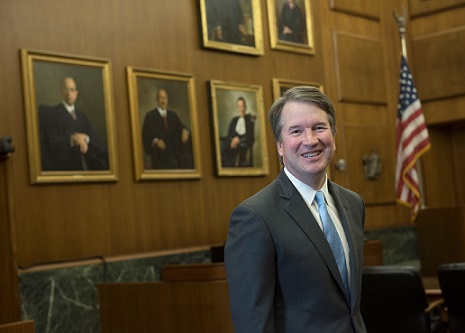Christine Blasey Ford's charge that Supreme Court nominee Brett Kavanaugh at 17 sexually assaulted her when they were both in high school has focused attention on the polarizing issue of juvenile justice reform.
While "Conservatives Suddenly Realize Juvenile Offenders Deserve Leniency," according to a column in New York magazine, juvenile justice reformers are not in complete agreement.
They have been joined by pundits across the ideological spectrum who have entered the fierce debate to either score political points against their enemies, downplay the seriousness of the allegations or, in some cases, raise awareness about the need for broader reforms in how the justice system treats juveniles — including sex offenders on lifelong registries.
Former Soros Justice Fellow Josh Gravens said of the conservatives who contend that Kavanaugh's behavior — if proven — should be viewed as ancient history or "boys being boys": "I'm highly skeptical that their leniency to Kavanaugh will lead to their change of heart about juvenile justice. It hasn't played out that way in the Trump administration." Now 32, he remained on a public sex offender registry for nearly two decades in Texas and in juvenile prison for 3½ years for having inappropriate sexual contact with his 8-year-old sister when he was 12.
Some Kavanaugh defenders are using arguments traditionally made by progressive juvenile justice reformers (e.g. Human Rights Watch), contending that his reputation and career opportunities shouldn't be destroyed by his actions as an irresponsibly drunk 17-year-old. But unlike the estimated 200,000 U.S. citizens on sex offender registries for crimes they committed as children (based on latest available data) he wasn't placed on such a list because he was never prosecuted for a sex offense.
Longtime reformers, such as Josh Rovner, a senior advocacy associate at the Sentencing Project, have used comparable, if more nuanced, arguments to press for broad changes in the way the criminal justice system has treated disadvantaged and minority youth.
In a thoughtful essay for The Atlantic, he sought to educate the public about the many ways that adolescents without Kavanaugh's upscale advantages who get in trouble with the law can be needlessly damaged for life: "Almost all kids break the law at some point," but most outgrow their teenage recklessness — while as many as 60,000 youth are still charged as adults and locked up annually in adult jails, he wrote.
"Young people's futures are not destined by their worst acts,” said Rovner in an interview (he and his organization aren't taking an official position on the Kavanaugh nomination). “There are many people who have shown remorse and been rehabilitated after committing a serious offense. In other words, the question isn't only what Judge Kavanaugh did in 1982."
If the allegations by Ford are true, a central issue is whether he's lying now about his youthful sexual misconduct or in any of his previous FBI background investigations — and that means making a judgment on his character and fitness for office in 2018, Rovner said. Josh Gravens agreed: "Kavanaugh’s alleged actions as a teen shouldn’t be the deciding factor on his character — it’s what he does now."
For most reformers, that perspective allows them to be skeptical of Kavanaugh while still maintaining their faith in juvenile offender rehabilitation — and their evidence-based opposition to incarceration and lifelong sexual registries. (One example: A 2018 study in the Psychology, Public Policy and Law journal found that children on sex registries were five times more likely to be propositioned for sex by adults than other kids.)
But a few juvenile justice advocates believe that what Kavanaugh allegedly did at 17 should matter now. “If this sexual assault is proven true, it probably should be disqualifying,” said Daniel Macallair, the executive director of the Center on Juvenile and Criminal Justice. “This is for a lifetime appointment to the Supreme Court. That’s not the same as trying to apply for a job at the local Walmart.”
